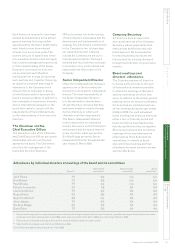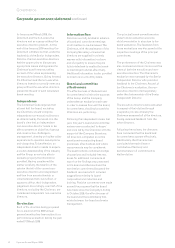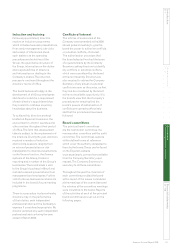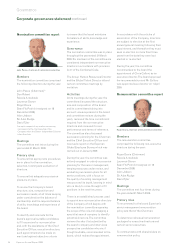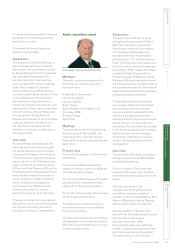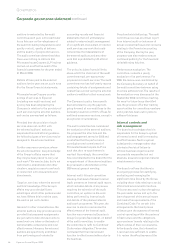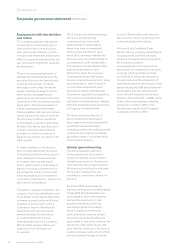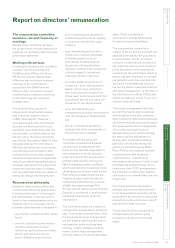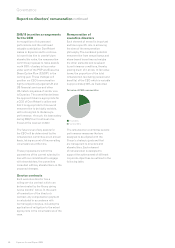Experian 2009 Annual Report Download - page 52
Download and view the complete annual report
Please find page 52 of the 2009 Experian annual report below. You can navigate through the pages in the report by either clicking on the pages listed below, or by using the keyword search tool below to find specific information within the annual report.
50 Experian Annual Report 2009
Governance
Corporate governance statement
As the Combined Code states, boards
should set the values and standards
for a company. Experian’s board is
committed to the highest standards of
corporate governance and believes that
such standards, which apply equally
to Experian’s directors and employees,
are critical to business integrity,
performance and to maintaining
investors’ trust in Experian.
The Combined Code on
Corporate Governance
The Combined Code on Corporate
Governance published by the UK
Financial Reporting Council in June
2006 sets out guidance on how
companies should be directed and
controlled to ensure good governance
practice and is applicable to this
reporting period. The Financial
Services Authority requires companies
listed in the UK to disclose, in relation
to Section 1 of the Combined Code,
how they have applied its principles
and whether they have complied
with its provisions throughout the
accounting year. This statement sets
out details of how the Company has
applied the principles and complied
with the provisions of the Combined
Code during the year ended 31 March
2009. Further information on the
Combined Code can be found on the
Financial Reporting Council’s website
www.frc.org.uk.
Statement of compliance
It is the board’s view that the Company
has been compliant with the provisions
set down in Section 1 of the Combined
Code throughout the year ended 31 March
2009.
The board
The directors have responsibility to the
Company’s shareholders for ensuring
that the Company is appropriately
managed and that it achieves its
objectives. The board meets regularly
to determine the Company’s strategic
direction, review the Company’s
operating and nancial performance
and oversee that the Company is
adequately resourced and effectively
controlled. The specic duties of the
board are clearly set out in a formal
schedule of matters reserved to the
board for decision. There is a wide
range of corporate governance issues
and items that are specically reserved
for decision by the board. Matters
requiring board approval include:
The Group’s long-term objectives
–
and commercial strategy.
The annual operating and capital
–
expenditure budgets and any
material changes to them.
Acquisitions, disposals and other
–
transactions above delegated limits.
Major changes to the Group’s
–
capital structure, corporate
structure, or any changes to the
Company’s listing or its status as a
public limited company.
Announcements of half-yearly and
–
preliminary results and interim
management statements.
Dividend policy.
–
Treasury policy, including entry into –
banking facilities, foreign currency
exposure and the use of nancial
derivatives.
Shareholder documentation.
–
The full schedule of matters reserved to
the board is available from the Company
Secretary on request and on the
Experian website www.experianplc.com.
One of the Group’s key internal
governance documents is the Global
Delegated Authorities Matrix. This
draws together the schedule of matters
reserved to the board, the terms of
reference for the board committees as
well as authority levels for the Group’s
principal operating subsidiaries,
directors and senior executives. For
those matters not specically reserved
to the board, the Matrix prescribes
the cascade of authorities delegated
throughout the Group by respective
Group companies, together with the
monetary limits of the delegations.
Responsibility for approval of smaller
acquisitions, disposals and other
transactions has been delegated by
the board to its principal operating
subsidiaries. Approval of capital
expenditure and revenue expenditure
(within dened monetary limits) has
also been delegated to the principal
operating subsidiaries. The Company
Secretary ensures that, at each of its
meetings, the board receives reports
on the activities of its committees and
copies of minutes of the meetings of
the principal operating subsidiaries to
monitor the exercise of the delegations.
The board and its committees operate
in line with an agreed work plan. The
January meeting focuses on strategy,
the March meeting deals with the
approval of operating budgets for
the coming nancial year and the
May and November meetings cover
the consideration of the annual
nancial statements and the half-
yearly nancial report respectively.
The Chief Executive Ofcer and the
Chief Financial Ofcer provide reports
at all scheduled board meetings and
senior executives below board level are
often invited to make presentations
to the board and participate in certain
aspects of the strategy and budget
reviews.
The directors
The board currently comprises the
Chairman, the Chief Executive
Ofcer, the Chief Financial Ofcer,
the President and Chief Operating
Ofcer and six independent non-
executive directors. It is the current
intention of the board to appoint an
additional non-executive director at an
appropriate time. Each non-executive
director serves for a xed term not
exceeding three years that may be
renewed by mutual agreement. Subject
to the board being satised with a
director’s performance, independence
and commitment, each non-executive
director may normally serve a
maximum of three terms of three years.













